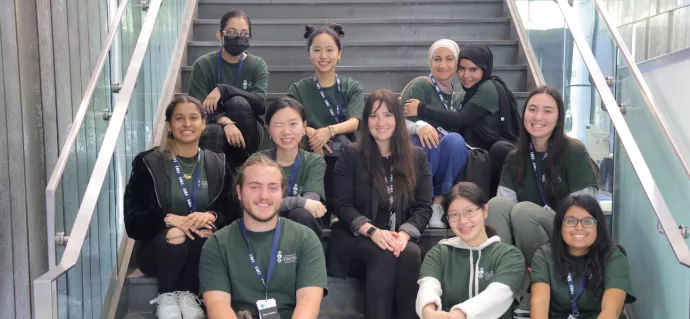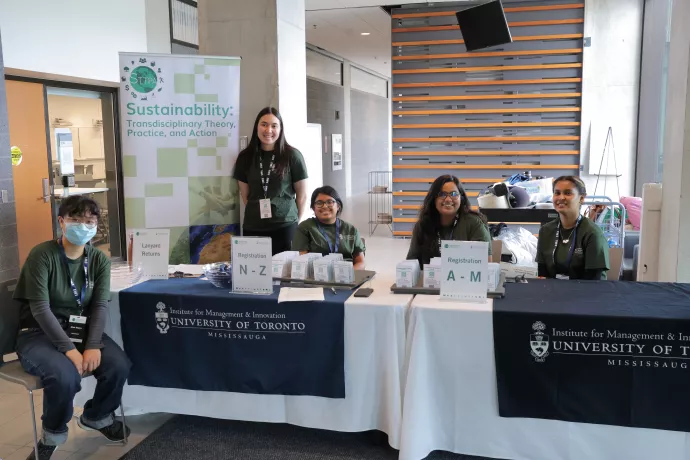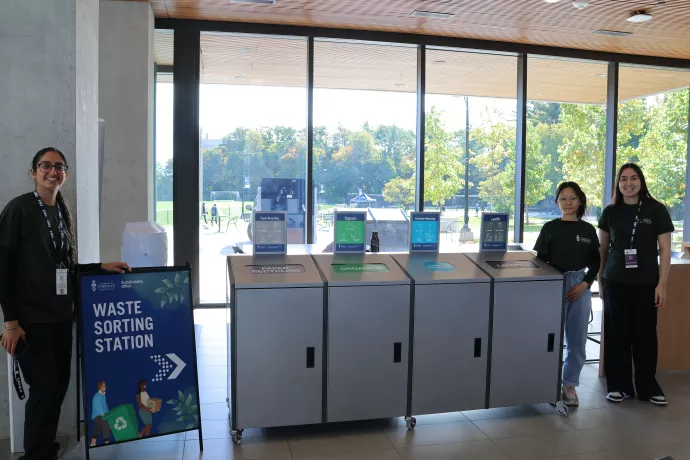
Making Sustainability Actionable and Rewarding: UTM's Sustainability Ambassador Program
“We need to break down the misconception that making the world a more sustainable place only belongs to certain disciplines” says Sustainability Project and Engagement Coordinator Michelle Atkinson; “in fact, it belongs to us all!” For the last year and a half, Atkinson, along with support from University of Toronto Mississauga (UTM) Sustainability Office and IMI, has played an instrumental role in creating and bringing the Sustainability Ambassador Program (SAP) to life. The SAP is a community engaged learning program for UTM students to engage in experiential learning opportunities and volunteerism related to sustainability and environmentalism. SAP is involved in everything from supporting academic conferences and sustainability awareness initiatives to facilitating events and unique projects, such as helping the UTM community to engage in better waste sorting practices, and more!

The Sustainability Ambassador Program has three major streams that volunteers can contribute to depending on their strengths and interests; students interested in learning and practicing better waste sorting can work for the Waste Education and Engagement stream, or students whose key strengths lie in writing or graphic design, for example, can show off their skills for the Outreach and Communications stream. With over 50+ passionate volunteers, Atkinson remarks that SAP is designed to “[empower students] to take their in-person learning and apply it to increasing awareness of sustainability on campus”, as well as help students refine their leadership skills, problem solve with like-minded individuals, and challenge themselves.
Where did the idea for this Program come from? Last year, the UTM Sustainability Office initiated the Waste Ambassador Program, a student-focused volunteer program that supports better waste management practices on campus. At the same time, MScSM developed the Sustainability Ambassadors Program centered in the frameworks of the United Nation’s 17 Sustainable Development Goals (SDGs) and the sustainability triangle, social change model, as well as following critical reflection for integrated learning. Both programs were widely successful, and it only made sense to merge them and work together! SAP offers further opportunities for students interested in sustainability in a holistic way; there are various avenues individuals and organizations can take to equally pursue and contribute to a sustainable future. “We could not have built this program without the wonderful partnership of the UTM Sustainability Office, in particular, Samantha DiIorio, a fellow MScSM alumna herself”

The threats of climate change are sometimes anxiety-inducing and difficult to talk about. “In any experiential learning opportunity, reflection is key” says Atkinson. Indeed, at its core, SAP is invested in creating a welcoming and informative space for students to pursue sustainability. It’s a space to share and reflect on diverse perspectives, collaborate towards a common goal, and develop key transferable skills and learn. In fact, volunteers at SAP come from rich and diverse academic backgrounds such as environmental management, biology, and geography. On top of that, every student has a personalized experience with sustainability, and everyone comes with their own questions or learning gaps. The diverse perspectives that students bring only strengthens and supports SAP’s mission of informed, peer-led sustainability engagement. This is very important because, on both local and global levels, sustainability is a shared and interdisciplinary initiative that requires all sectors of society to be engaged, and when it comes to having a role to play in sustainability, it does not matter where students are coming from. Atkinson poignantly mentions that “students fighting for a just and socially equitable world, education for all, art, activism, food security, the housing crises, health for all and more — all students, all disciplines can [and should] see themselves in sustainability.”
The Sustainability Ambassador Program is still in its infancy stages but growing. Moving forward, there are many more sustainability initiatives that Atkinson and her team want to pursue: in particular, connecting and empowering youth and children through a sustainability lens. “Last year” reflects Atkinson, “we hosted our first Climate Camp, a free day-camp to [guide] 24 youth from [the] ages 8-12 through learning about sustainability and the climate.” The younger generations are absolutely fundamental in the fight against climate change; this year, SAP expects to expand these youth-centered engagement opportunities to new frontiers. The future vision of SAP includes providing more diverse and accessible learning opportunities for all UTM students, as well as building their knowledge and confidence in pursuing sustainability both on campus and beyond! Click here for more information about SAP, or contact Michelle Atkinson to learn more.
